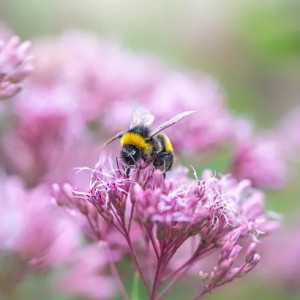How mini ‘motorway service stations’ in Leicester are helping bees survive

Urban bees in Leicester[1] are now travelling along specially-designed highways of wildflowers encircling the city which ensure they can stop every 30 minutes for a rest and a snack. Conservation efforts have focused on creating the corridors after evidence showed bees need nectar stops every half hour during their journeys. Leicester City Council[2] and Trent Rivers Trust teamed up with The World Wide Fund for Nature (WWF) in partnership with Air Wick to create the bee highways.
The wildflower meadows, begun in 2023 and now maintained by volunteers, provide feeding stations for bees that are making their way between larger parks and nature reserves across the city, including along Troon Way. The project addresses a significant environmental need, as the UK has lost almost 97 per cent of its lowland wildflower meadows since the 1930s, according to WWF-UK. These meadows spanning several miles around the city's ring road system are abundant with common knapweed and other native flowers that provide essential fuel for pollinating insects, says the WWF.
 Bees help pollinate 70 out of approximately 100 crop species (Image: Getty)
Bees help pollinate 70 out of approximately 100 crop species (Image: Getty)
"While bees are foraging for pollen, they need to be able to stop off and fuel up on nectar to then carry on about their business," said John Bristow, senior nature conservation officer at Leicester City Council[4]. "It's quite sad actually that while, for us, breaking down on the side of the road is a bad day, for bees, it's catastrophic." Scientists estimate around 90 per cent of flowering plants globally depend on bees and other pollinators, WWF-UK said. Mr Bristow suggested Leicester[5] residents could support local pollinators regardless of the size of space they have available.
"People can help pollinators on their own little patch, whether that be in their garden or even a window box," he added. "There are plenty of showy plants that will create these little pollinator pit stops, even in the most urban of environments."
Decline in Pollinators
Pollinators in the UK are under pressure, but not all species are affected equally, according to the Royal Horticultural Society (RHS). While some bumblebees and solitary bees are thriving, others with more specialised needs have seen their numbers and range decline over the past 30 years. The RHS says habitat loss is the biggest threat, with fewer wildflowers and nesting sites available due to changes in farming and land use.
Climate change and pesticide use - especially certain insecticides - are also having an impact, although managed honeybee numbers remain stable. Less is known about other pollinators like hoverflies, butterflies and moths, but many are also declining. The RHS advises avoiding pesticides, particularly on flowering plants, and growing a mix of pollinator-friendly plants in gardens to support insect populations.
We are now bringing you the latest updates on WhatsApp first[6]
References
- ^ Leicester (www.leicestermercury.co.uk)
- ^ Leicester City Council (www.leicestermercury.co.uk)
- ^ Opening date set for Leicestershire garden centre returning to its roots (www.leicestermercury.co.uk)
- ^ Leicester City Council (www.leicestermercury.co.uk)
- ^ Leicester (www.leicestermercury.co.uk)
- ^ We are now bringing you the latest updates on WhatsApp first (www.leicestermercury.co.uk)